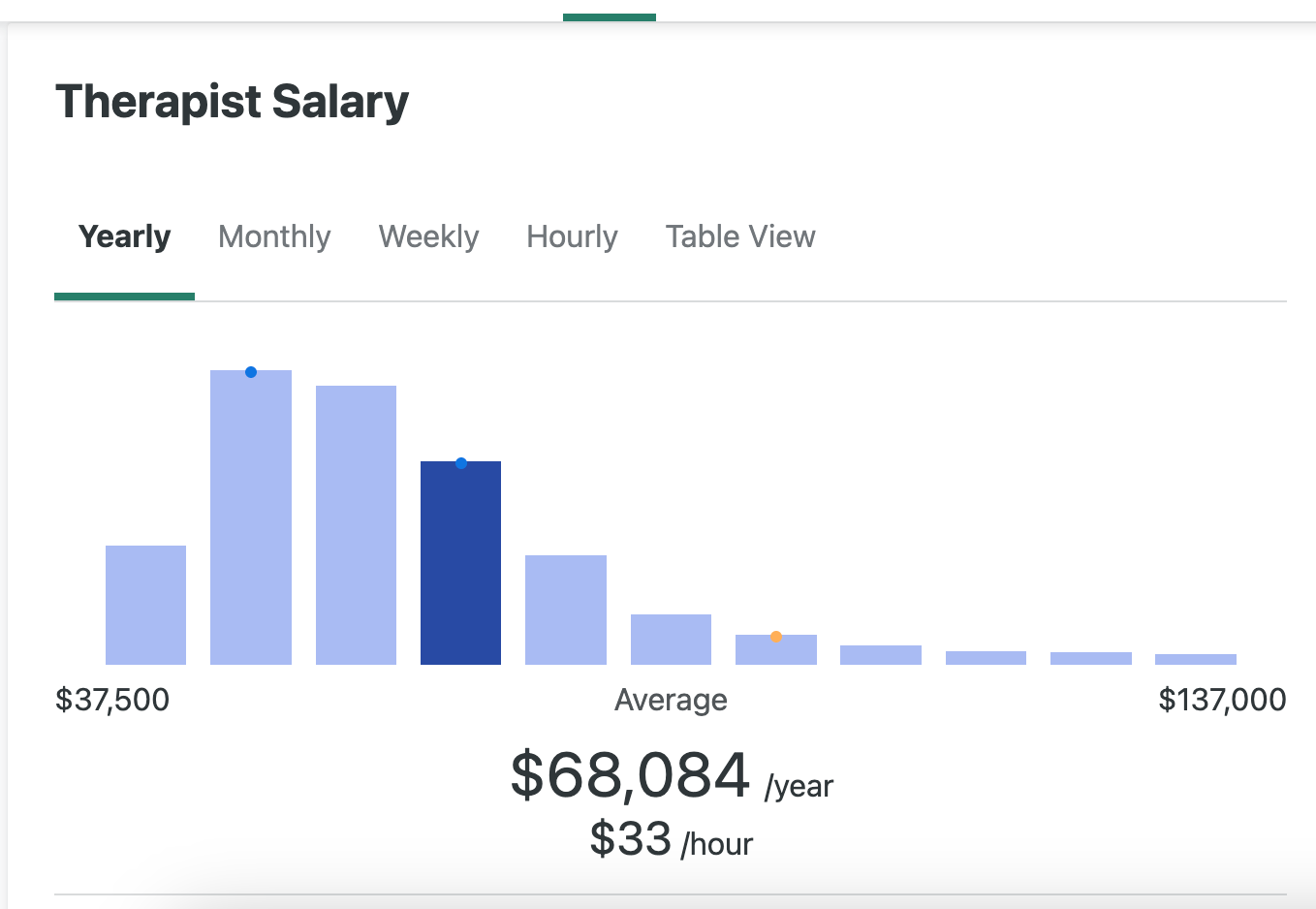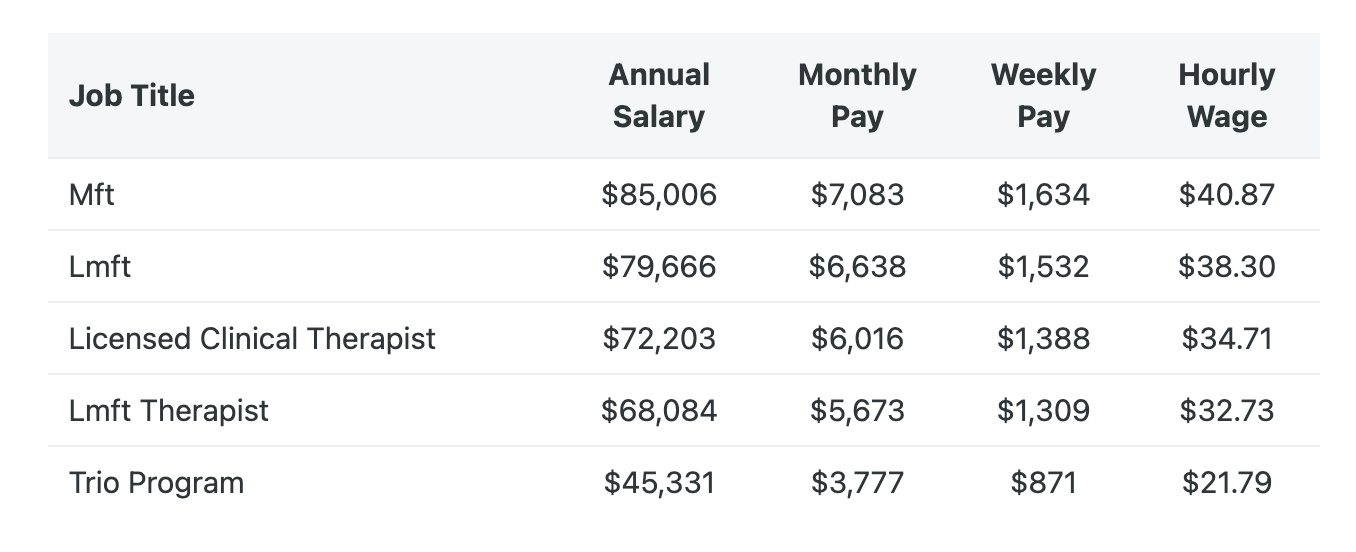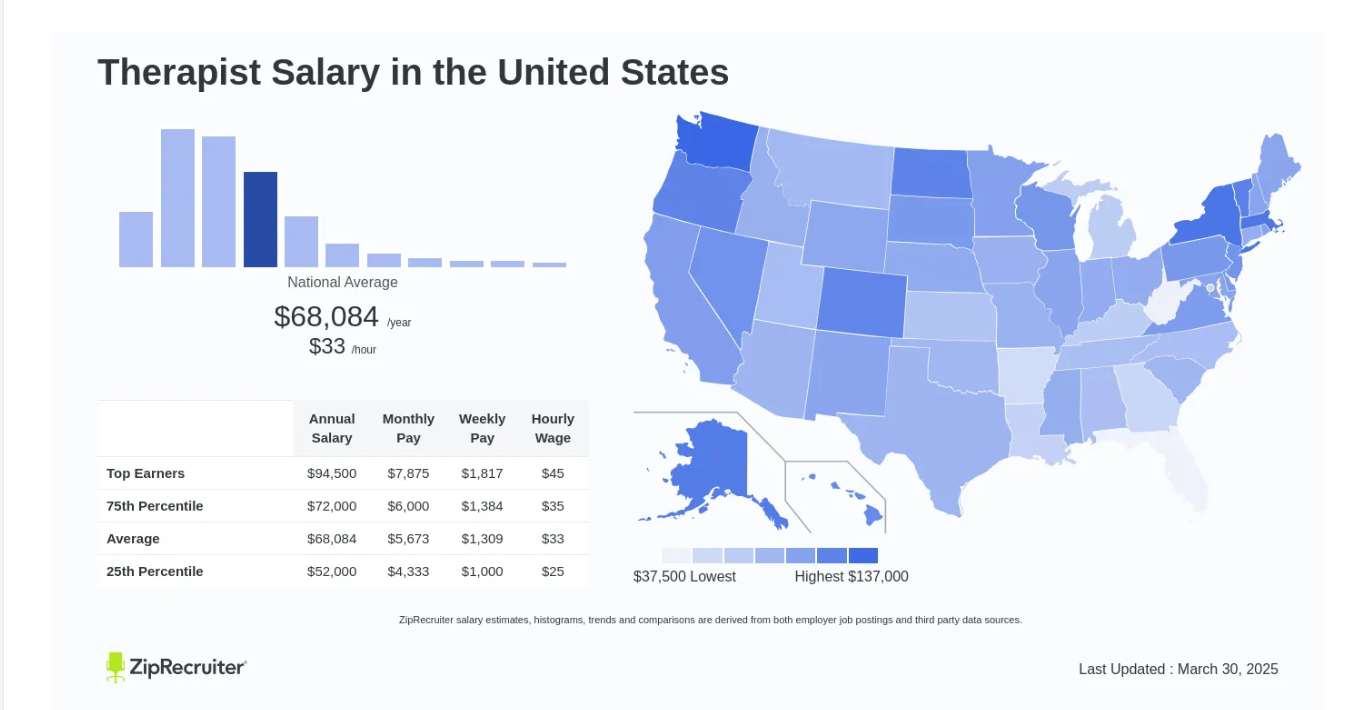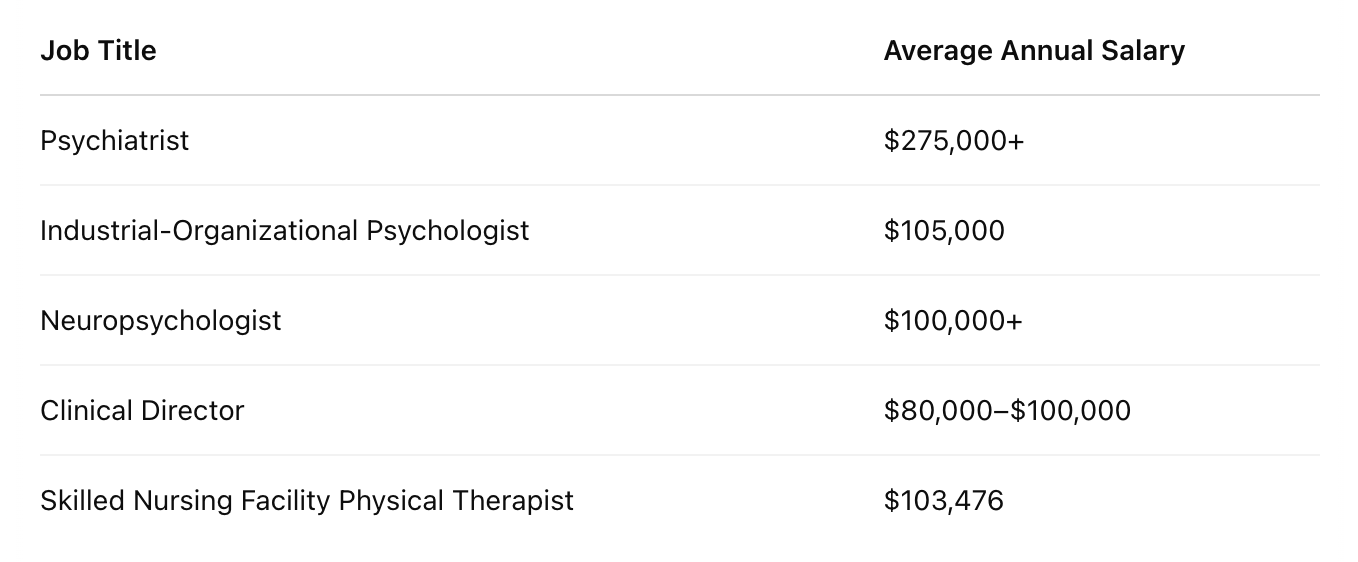How much does a therapist make in private practice and is it worth it
Let’s talk about money: the truth about therapist salaries
Let’s be real—no one talks about this enough. If you’re a therapist or considering becoming one, you probably love the work, the impact, and the deep connections you build with clients. But at the end of the day, you still have bills to pay.
How much do therapists actually make? Is private practice more profitable than agency work? Why do some therapists seem to be thriving financially while others struggle?
Money might not be why you got into this field, but financial stability is what allows you to keep showing up for your clients and build a sustainable career.
In this guide, we’ll break down therapist salaries across the U.S., the factors that influence your income, and how to strategically increase your earnings without burning out.
In case we haven’t met yet…Hi, I’m Natalia, a website designer for therapists and private practice owners. I help mental health professionals build high-converting, SEO-optimized websites that not only attract the right clients but also simplify their marketing efforts. If you’re looking to create a strong online presence that supports your financial and professional goals, I can help.
Factors that affect a therapist’s salary
Education and credentials
The type of degree you hold can significantly impact your earning potential. A master’s degree is the minimum requirement for most therapy-related jobs, but those with a doctoral degree tend to earn higher salaries. According to data from Indeed, clinical psychologists and other doctorate-level therapists often make between $90,000 and $120,000 annually, whereas master’s-level therapists typically earn between $55,000 and $80,000.
Licensure also plays a crucial role. Therapists with specialized certifications—such as LMFT (Licensed Marriage and Family Therapist), LCSW (Licensed Clinical Social Worker), or LPC (Licensed Professional Counselor)—often have greater earning potential, particularly if they pursue private practice.
Type of therapy and specialization
Certain therapy specializations command higher salaries due to demand and complexity. Here’s how some compare:
- Marriage and family therapists earn an average of $88,786 per year.
- Mental health counselors make around $47,000 annually.
- Clinical psychologists can earn $90,000+ depending on experience and setting.
- Speech and occupational therapists have median salaries ranging from $70,000 to $100,000.
More niche fields like neuropsychology, EMDR therapy, and forensic psychology can further increase earning potential.
Location and cost of living
Therapist salaries aren’t the same everywhere. Location plays a major role due to cost of living, demand for services, and state funding for mental health care.
Geography is one of the biggest factors affecting therapist salaries. States with higher living costs tend to offer higher salaries, while rural areas often pay less due to lower demand. Here’s a breakdown of average annual salaries across key states (ZipRecruiter):
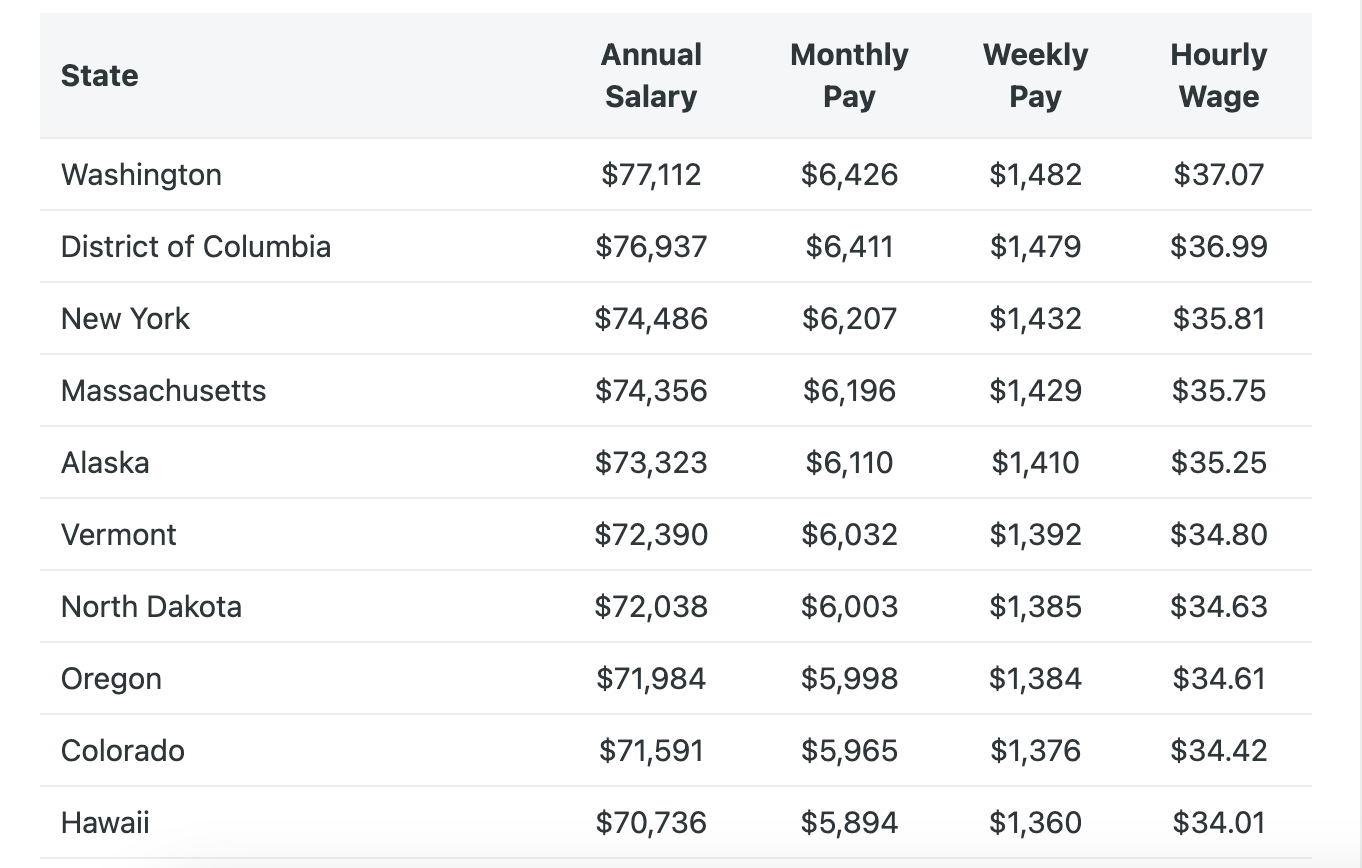
You can view the full breakdown of therapist salaries by state here from the source ZIP Recruiter.
Why do some states pay more?
- Higher cost of living – Therapists in cities like NYC or San Francisco need to earn more to cover rent, insurance, and other expenses.
- Greater demand – States with mental health shortages pay more to attract therapists.
- Insurance reimbursements – Some states have higher insurance payouts, increasing earnings for therapists who accept insurance.
You can find the full breakdown and more data by ZIP recruiter here
Experience and years in the field
Just like in any profession, experience plays a major role in how much therapists earn. The more years you’ve been in the field, the more you can typically charge—and the data backs it up.
- 0–1 years: Entry-level therapists often start on the lower end of the salary spectrum. In-home therapists, for example, average around $51,800 early in their careers.
- 4–6 years: Mid-career therapists tend to see an increase in earnings. Rehab therapists with 4–6 years of experience earn an average of $67,287 annually.
- 10+ years: With a decade or more of experience, many therapists move into senior roles or leadership positions. Lead therapists at this level can earn approximately $94,000 per year.
These averages reflect real-world numbers, but your exact salary may vary depending on your niche, location, and whether you're in private practice or working for an organization. Still, one thing’s clear: experience brings more earning power.
Sources:
- Zippia – In-Home Therapist Salary
- Zippia – RehabilitationTherapist Salary
- Zippia – Lead Therapist Salary
Employment type: private practice vs. agency work
- Private practice therapists often earn more per session but must handle marketing, insurance billing, and operational costs.
- Agency-employed therapists typically receive stable salaries and benefits but have lower earning potential.
The financial trade-off comes down to stability versus independence.
What are the best-paying therapist jobs?
While most therapy careers are deeply rewarding on a personal level, some roles also offer significantly higher earning potential. If you’re considering a specialty or thinking long-term about income goals, here are some of the top-paying therapy-related careers:
Let’s break these down:
Psychiatrist
As licensed medical doctors, psychiatrists diagnose and treat mental health conditions—often with a combination of therapy and medication. Because of their ability to prescribe and their medical training, they consistently top the charts in earnings.
💡 Median salary: $275,000+
Source: Wikipedia – Mental Health Professional
Industrial-Organizational Psychologist
This role blends psychology with business strategy. These professionals improve workplace culture, productivity, and hiring practices. If you’re passionate about psychology and intrigued by leadership and corporate systems, this could be a lucrative path.
💡 Median salary: $105,310
Source: Wikipedia – Psychologist
Neuropsychologist
Specializing in how brain function impacts behavior, neuropsychologists often work in hospitals, research, or rehabilitation centers. Their assessments support clients with brain injuries, dementia, and other neurological conditions.
💡 Average salary: $100,000+
Source: Verywell Mind – Highest Paying Psychology Careers
Clinical Director
A leadership role within healthcare settings, clinical directors manage therapy teams, oversee care protocols, and often handle budgets and compliance. Their combination of administrative oversight and clinical background makes this a strategic and well-compensated career move.
💡 Average salary: $80,000–$100,000
Source: Indeed –
Highest-Paying Psychology Jobs
Skilled Nursing Facility Physical Therapist
This role focuses on rehab for patients in long-term care facilities. It combines hands-on patient support with a high-demand healthcare niche, often leading to strong compensation—especially in urban or high-need areas.
💡 Average salary: $103,476
Source: ZipRecruiter – Physical Therapist Salaries
How to increase your earnings as a therapist
Expanding your private practice
Offering additional services like group therapy, couples intensives, or online counseling can significantly boost income. Many therapists supplement their earnings by providing workshops, writing books, or launching online courses.
Becoming a niche expert
Specializing in high-demand fields such as trauma therapy, EMDR, or autism spectrum disorder can allow therapists to charge premium rates. Consider pursuing advanced certifications to stand out in your niche.
Creating multiple income streams
Many therapists generate additional revenue through:
- Teaching and supervision
- Public speaking engagements
- Writing books or offering online courses
- Hosting podcasts or YouTube channels
Leveraging SEO & digital marketing to get more clients
A well-optimized website can help therapists attract high-paying clients. SEO for therapists is a crucial strategy to ensure a steady flow of inquiries. If your practice isn't showing up on Google, you're likely losing potential income.
Is it better to work online than having a private practice?
With the rise of teletherapy, more therapists are shifting to virtual work. But is it actually better than traditional in-person sessions? The answer depends on your priorities, professional goals, and lifestyle preferences.
Benefits of online therapy
- Lower overhead costs – no need to pay for office rent, utilities, or furniture
- More flexible schedule – set your own hours and work from anywhere
- Larger client pool – expand beyond your local area and reach more people
- Better work-life balance – eliminate commuting, reduce burnout, and have more control over your time
- Higher session capacity – see more clients per day without needing to accommodate travel time
- Reduced no-shows – virtual appointments make therapy more accessible, leading to fewer cancellations
Challenges of online therapy
- Tech dependence – requires stable internet, a secure video platform, and digital literacy for both you and your clients
- Licensing restrictions – therapists must be licensed in the state where their clients reside, limiting who you can work with
- Less personal connection – some clients may prefer face-to-face interaction and find virtual sessions less engaging
- Security concerns – handling confidential information digitally requires compliance with privacy regulations like HIPAA
- Increased competition – many therapists are shifting to online work, making it harder to stand out
So, is online therapy worth it?
If you prioritize flexibility, cost savings, and a broader client base, online therapy can be a highly profitable and scalable option. However, if you thrive on in-person connection and want to build a local reputation, traditional private practice may be a better fit.
A hybrid model—where you offer both in-person and virtual sessions—can provide the best of both worlds.
How can I earn more as a therapist?
If you’re looking to increase your earnings, consider these five proven strategies that can help you maximize your income without overworking yourself.
1. Specialize in high-demand areas
Not all therapy niches are equal when it comes to income potential. Certain specialties allow therapists to charge higher fees due to their complexity, demand, and impact. Some of the most profitable therapy specializations include:
- Trauma therapy – certifications in EMDR or PTSD treatment allow for premium pricing
- Couples counseling – high demand for relationship therapy, especially for affluent clients
- Corporate coaching & executive mental health – companies are investing more in mental wellness for employees
- Neuropsychology & testing – therapists who conduct evaluations and testing can earn significantly more
2. Offer more services
Expanding your offerings can help you increase revenue without increasing your caseload. Instead of just one-on-one therapy, consider adding:
- Group therapy sessions – more clients per session means a higher hourly rate
- Workshops or retreats – one-time events can bring in a substantial income boost
- Online therapy & telehealth – reach clients who prefer virtual sessions or live in remote areas
- Supervision for new therapists – help train and mentor professionals entering the field
3. Monetize your expertise beyond therapy sessions
Many therapists generate passive income by sharing their knowledge in different ways. This can help you earn more while reducing client hours.
Some popular revenue streams include:
- Online courses & e-books – create resources that clients can purchase at any time
- Membership programs – offer exclusive content, group coaching, or ongoing support for a monthly fee
- Speaking engagements & corporate training – companies and organizations pay well for mental health expertise
4. Get more clients through SEO & marketing
A strong online presence can attract higher-paying clients and fill your caseload with ideal-fit clients. To optimize your marketing:
- Build an SEO-optimized website so potential clients can find you on Google
- Create blog content answering common therapy-related questions
- Use Google My Business to rank in local searches
- Leverage social media for brand awareness and client referrals
5. Consider relocating to a higher-paying area
Moving to a state or city with better insurance reimbursements, higher salaries, and increased mental health funding can instantly boost your earnings. Some of the highest-paying states for therapists include:
- New york – high salaries but also high cost of living
- California – strong demand for therapy services, especially in metropolitan areas
- Washington – great insurance reimbursements for mental health care
- Massachusetts – consistently ranks among the best states for therapist pay
- Colorado – growing demand for therapy, especially in private practice
Is being a therapist financially worth it?
Therapy is an emotionally demanding field, and burnout is a real risk. However, with strategic planning, therapists can build sustainable careers that provide both financial security and work-life balance.
While entry-level salaries may be modest, long-term financial growth is achievable through specialization, private practice, and multiple revenue streams. The field of mental health continues to expand, with increased demand for therapy services ensuring job stability.
The mental health field continues to grow, and the demand for therapists is higher than ever. With the right business strategies, a therapy career can be both emotionally fulfilling and financially rewarding.
Build a practice that supports your life
Your therapy career should be as fulfilling financially as it is emotionally. Whether you’re in private practice, working for an agency, or looking to expand your income, understanding salary trends and business strategies can help you make informed career decisions.
And one of the best ways to ensure financial success? A strong online presence.
A professional, SEO-optimized website helps you attract your ideal clients, increase bookings, and grow your practice with ease.
If you're ready to take your therapy career to the next level, let’s build a website that works for you.
➡ Explore my web design and SEO services for therapists here
Related reads:
- Where to find the best writer for therapists and what to consider
- 150+ Quotes for speech therapists: Inspiration, Communication, and Growth
- 200+ quotes for therapists: inspiration, healing, and growth
- Are Google Ads for therapists worth it? Pros and Cons
- The best practice management software for your private practice
- Should you have your website in Simple Practice? Pros, cons, and website examples

* AI Disclosure: This content may contain sections generated with AI with the purpose of providing you with condensed helpful and relevant content, however all personal opinions are 100% human made as well as the blog post structure, outline and key takeaways.
* Affiliate Disclosure: Some of the links on www.nataliamaganda.com may contain affiliate links meaning that I will get a commission for recommending products at no extra cost to you.

hello! i'm natalia
Latina, web design expert for mental health professionals.
I help ambitious life coaches, therapists and holistic leaders amplify their magic, gain visibility, and simplify their marketing efforts through strategic web design and content.





